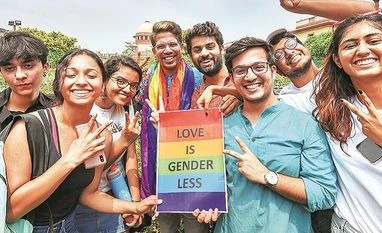The Supreme Court judgment that edited Section 377 of the IPC is only the first step in setting right discrimination against sexual minorities. LGBTQ people now legally possess the same rights of consent and privacy as heterosexuals. This should, over time, lead to less harassment since, at the least, it prevents the police from barging into private spaces.
However, legal provisions can take a long time to become social norms. Think of caste discrimination, dowry, or female infanticide. These three things have been illegal for decades while continuing to receive wide social sanction. Again, think of the way the police have behaved in recent lynching cases, where they have autopsied the contents of fridges rather than questioning the murderers.
So, it would be naive to think that anti-LGBTQ sentiment will vaporise in the wake of the judgment. Several socially regressive, religious bodies (is that a tautology?) have already issued statements dog-whistling in favour of continuing discrimination against LGBTQ people.
I can envisage larger, more joyous, pride parades in the future as more people emerge from the closet. I can, just as easily, envisage attempts to violently disrupt such gatherings, coupled to attacks on LGBTQ couples on Valentine’s Day, assaults in bars, etc. I can also see violent pushback — not everyone in the LGBTQ community will turn the other cheek.
The judgment irrevocably changes things in other areas. It is only a matter of time before there are demands to legitimise same-sex marriages by amendment of the Special Marriage Act. As it happens, I know a lady doctor from small-town UP, who has already written to Shaadi.com, requesting the matrimonial website to find suitable boys for her (highly eligible) NRI son.
Marriage will be the next elephant in the LGBTQ bedroom and of course, that issue will also go through courts and legislatures. After this historic judgment, LGBTQ activity continues to be criminalised in about 70-odd nations, which means that it’s legal in over 100 countries. But there are only about 30 nations where same-sex unions are legal or recognised (if performed in another country).
Marriage is a convenience for anybody in a stable relationship. It is a legal contract that automatically confers inheritance rights and multiple other rights. For example, a spouse can sign a consent form for medical procedures if the subject is incapable. Divorces involve legally enforceable divisions of assets.
Then, there’s children. Though India, unsurprisingly, has enormously complicated and archaic adoption laws, technology could provide solutions. Gay couples can either adopt or organise surrogate pregnancies though the relevant laws will require changes. Lesbians can also arrange for pregnancies via artificial insemination.
Families that haven’t thought things through will have to contemplate those possibilities. The technology may be there, but the law is an obstacle. Legalising same-sex marriages, clarifying adoption laws, easing surrogate parenting laws — each will involve legal battles and political support. This will eventually be inevitable. But, going by experience in other democracies, there will be bitter legal and political battles for several decades before the law does change in these respects.
This is why, over time, the “rainbow vote” could become a determinant in close, first-past-the-post electoral contests. It’s hard to get a handle on the number of LGBTQ persons in India. But experience from elsewhere tells us that the number owning up to minority orientation will rise, now that it’s legal.
In Western Europe and North America, 4-5 per cent of the population claim LGBTQ orientation and this cuts across religious and cultural barriers. The right to marry, and to have children, is an emotive, existential issue. The rainbow vote is multiplied by the votes of those hetero people, who believe that everybody deserves the right to marry, and have children. The vote would be diffused, but it could be substantially larger than the actual LGBTQ population. Over time, any political formation that promises to extend those rights to LGBTQ people might reap a dividend.
Unlock 30+ premium stories daily hand-picked by our editors, across devices on browser and app.
Pick your 5 favourite companies, get a daily email with all news updates on them.
Full access to our intuitive epaper - clip, save, share articles from any device; newspaper archives from 2006.
Preferential invites to Business Standard events.
Curated newsletters on markets, personal finance, policy & politics, start-ups, technology, and more.
)